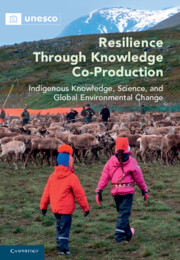 Resilience through Knowledge Co-Production
Resilience through Knowledge Co-Production from Part III - Global Change and Indigenous Responses
Published online by Cambridge University Press: 02 June 2022
Storytelling among indigenous peoples is central to the intergenerational transmission of indigenous and local knowledge (ILK), allowing for human adaptation to new social-ecological contexts. However, little attention has been paid to the potential applications of storytelling in guiding climate change adaptation efforts. In this chapter, we present a number of case studies from all over the world in which indigenous stories and traditional oral narratives have been applied to inform culturally sensitive climate change adaptation strategies. We contend that greater consideration of indigenous ontologies, as transmitted through storytelling, can contribute towards making climate change communication and adaptation more acceptable to local communities, facilitating intercultural discussions and bridging worldviews. Our chapter shows that attention to and promotion of indigenous storytelling can lead to enhanced understanding of diverse values and perceptions around climate change, hence allowing climate change adaptation strategies to become tailored to the local contexts where they are implemented.
To save this book to your Kindle, first ensure no-reply@cambridge.org is added to your Approved Personal Document E-mail List under your Personal Document Settings on the Manage Your Content and Devices page of your Amazon account. Then enter the ‘name’ part of your Kindle email address below. Find out more about saving to your Kindle.
Note you can select to save to either the @free.kindle.com or @kindle.com variations. ‘@free.kindle.com’ emails are free but can only be saved to your device when it is connected to wi-fi. ‘@kindle.com’ emails can be delivered even when you are not connected to wi-fi, but note that service fees apply.
Find out more about the Kindle Personal Document Service.
To save content items to your account, please confirm that you agree to abide by our usage policies. If this is the first time you use this feature, you will be asked to authorise Cambridge Core to connect with your account. Find out more about saving content to Dropbox.
To save content items to your account, please confirm that you agree to abide by our usage policies. If this is the first time you use this feature, you will be asked to authorise Cambridge Core to connect with your account. Find out more about saving content to Google Drive.